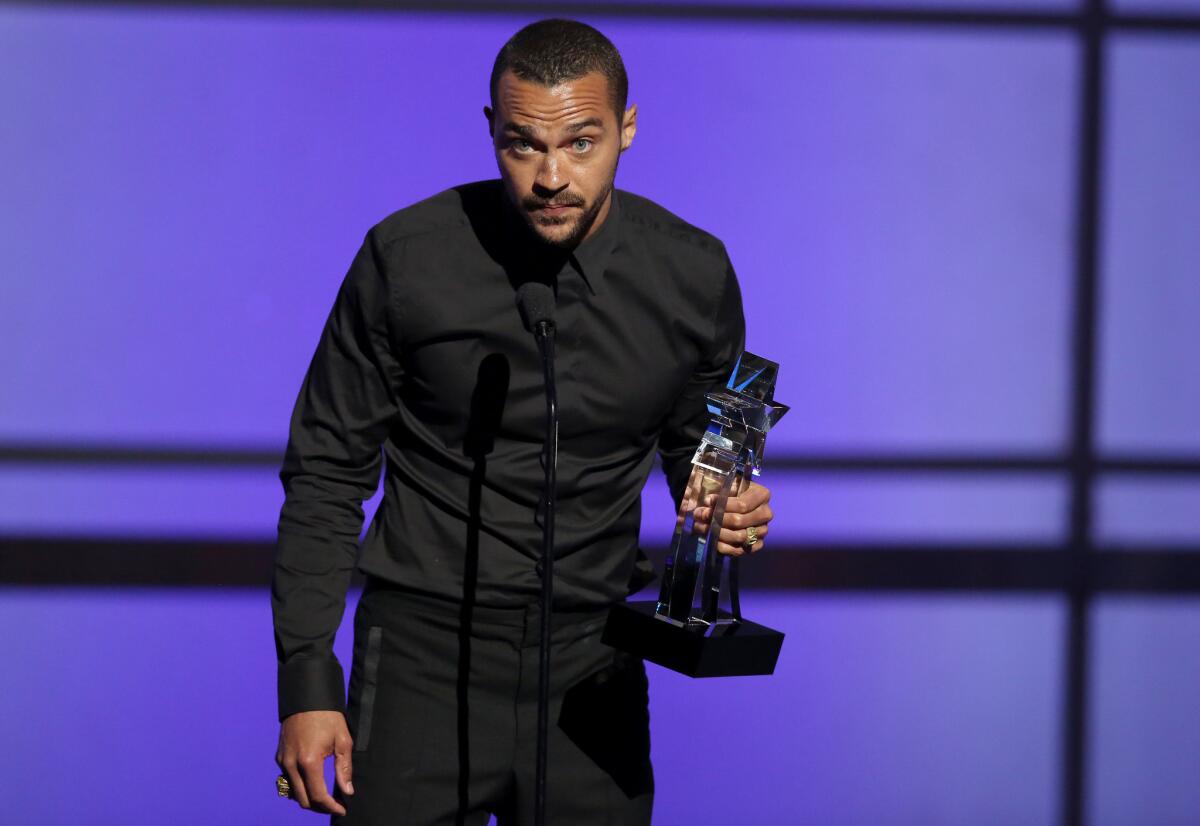Analysis:: Jesse Williams and the academy just changed Hollywood’s race conversation. What’s next?
- Share via
The last week has been a watershed one for race and Hollywood.
The motion picture academy, responding to the outcry over an absence of minorities in its ranks — and consequently its nominees — invited nearly 700 film professionals to become members. It’s by far the academy’s biggest new class, with more than 40% of the invitees people of color.
Three days earlier, at the BET Awards, “Grey’s Anatomy” star Jesse Williams unleashed a powerful, often frustrated, speech about an imbalance of power.
“We’ve been floating this country on credit for centuries,” he said. “And we’re done watching and waiting while this invention called whiteness uses and abuses us ... extracting our culture, our dollars, our entertainment, like oil, black gold.”
There was a yin-and-yang quality to these two events: a fiery young actor issuing a call for justice and a staid establishment making a welcome, but undeniably low-key and belated, attempt at change. Together they represent not just the urgency of the issue of African American inequity but the range of responses to it: voluble and quiet, sweeping and surgical, upstart and within the system.
See the most-read stories in Entertainment this hour »

This to-and-fro will continue in the coming months. When the weather cools and moral seriousness replaces summer escapism in the country’s movie culture, the question of racial justice will arrive in theaters. “Birth of a Nation” and “Loving,” two major fall releases, each tackle issues of inequality, and the reception to them will be read, sometimes fairly and sometimes unfairly, as a litmus test of progress.
In these socially conscious times, Hollywood awards have become a tool for change despite, or perhaps as a reaction to, their red-carpet frivolity. In their hosts’ and winners’ quips and major statements, they’ve almost become a reflecting pool of ourselves. And these two movies offer up some clear waters.
Nate Parker’s “Birth of a Nation” will signal a new moment when it arrives in theaters Oct. 7, or at least a new modern moment. Made independently on the fumes of its director’s passion, the film follows Nat Turner (Parker), a Baptist preacher, as he quietly awakens to the reality of his fellow slaves and then begins to foment and lead an insurrection.
In Parker’s dramatization of Turner’s 1831 slave rebellion, there comes a Williams-like call to action. (At the BET Awards, Williams actually thanked Parker, who helped introduce him in a clip.) “Birth” is a seething work, calling to mind the very few other movies that have similarly spoken out. One imagines it as a “Do The Right Thing” for the 21st century — Turner picking up an ax and charging at slave-owners offers a visual counterpoint to Mookie picking up the trash can and tossing it through the window of Sal’s Pizzeria. By setting itself in a distant history, it offers a blueprint for a more active rage today. The further back one goes, the greater the freedom to indict, and Parker traverses the ground with maximum license.
Less than a month after “Birth” will come “Loving,” another story drawn from history, this one more recent, of the long trial, and trials, of Richard and Mildred Loving, a white man and black woman who in 1958 were banished from their home in Virginia for the crime of miscegenation.
Directed by the white Southern filmmaker Jeff Nichols, it is an atmospheric, plaintive piece. What appears to be a story about the villainy of a sheriff and a bloody fight against him transmutes into an ordinary struggle of living in exile, in Washington, D.C., and enduring the pain mainly through love. The couple rebels not by picking up weapons but quietly remaining married as prejudice lurks.
There is eventually a legal challenge, but even on this latter score the film is restrained; it shows almost nothing inside a courtroom, instead focusing more narrowly on the Lovings’ interactions with the ACLU, which takes matters from there as the couple return to raise their children.
“Loving” is the quiet, systemic academy approach, to “Birth’s” bold, challenging hand grenade of a Williams awards speech. And like those events, these films will advance and reflect an ideological quarrel about the approach to injustice.
There’s already been a kind of preemptive backlash from some (largely white) insiders to “Birth,” perhaps because it lacks the level of artistic radicalism of its recent Oscar-winning companion piece, “12 Years a Slave,” or perhaps for motives more questionable. The film was given a standing ovation by a predominantly black audience at its Sundance Film Festival premiere before it screened, an unorthodox turn that has become a flashpoint for some white people in the industry.
It is, to say the least, an odd criticism. With its undercurrent that the system is rigged in favor of a black person, the diss is both off-point and a kind of socially acceptable way to air a race-based grievance, an O.J. Simpson trial for the new century. (His story, in the docuseries “O.J.: Made in America” from the mixed-race director, Ezra Edelman, will also hover this coming Oscar season.) What the Sundance audience was clapping for was not the film, of course, but Parker’s temerity in making it, an actor overcoming not just independent-film obstacles but the built-in bias against black casts and historical subjects.
But the reaction is telling.
“Birth” is a film that makes people feel uncomfortable — that is designed to make people feel uncomfortable, even as Parker, in selling the movie to largely white distributors and media, may be too diplomatic and savvy to say it. The white people are not the heroes; in fact they are rarely even benign figures. In a single stroke, Parker has turned around decades of civil rights filmmaking and its cross-racial arm-locking, almost as if to say, “You see, what was so hard about that?”
‘Loving’ is the quiet, systemic academy approach, to “Birth’s” bold, challenging hand grenade of Jesse Williams’ awards speech.
— Steven Zeitchik
If the response to “Birth” suggests a lesson, so does the reception to “Loving.” At the Cannes Film Festival, where it premiered, some viewers, black and white, took it to task for too much restraint, for not giving the Lovings the ardor their fight deserved. They asked, in their own unexpected criticism, if the movie was angry enough.
But Nichols never puts the brick through the Loving’s window, never shows them raising their arms at a 1960s-era march taking place just a few miles away, because they didn’t do that, because that was not the way they fought the system. “Loving” is not designed to tap into anger, just as “Birth of a Nation” is not built for comfort.
When I asked Parker at Sundance whether it was an angry work, he demurred. “It promotes healing,” he said. But he also believes that it’s a film that “challenges your privilege and your comfort ... you’re either part of the solution or you’re passive in your complicity.”
When I asked Nichols at Cannes whether he thought his movie was overly passive, he said, “People say this isn’t insolent enough, this isn’t aggressive enough. I don’t have a lot of patience for that particular critique. The Lovings chose to fight by living their lives as they wanted.”
These are two very different responses to injustice, no less incensed but varying greatly in their battle tools — a manifestation, with some qualifications, of Malcolm X and Martin Luther King, writ large and cinematic. And they come from two men, Parker and Nichols, who are themselves two sides of a coin — black and white, born in the South within a year of each other in the late 1970s, each choosing cinema to address race, now unwittingly but unquestionably in conversation with one another.
The #OscarsSoWhite debate is its own form of trans-cultural conversation and a symptom of the divide. Some academy members see the movement as unfairly lamentational. Didn’t “12 Years a Slave” just win best picture several years ago; what is our affirmative responsibility, as a movie-awards organization, to integrate diversity into our aesthetic judgments?
Those protesting perceive a deaf ear. Did you think honoring one movie exempts you of a responsibility; is addressing racial inequality an obligation to be dispatched, an annoyance that one movie, or a few new members, can simply preclude?
Breaking into this argument in the coming months will be the cinematic voices, “Loving” with its low rumble and “Birth” with its high-volume distress call. Who will hear these sounds and how they will respond will offer a moment of truth, spoken by a new and more existentially complicated academy as it sits down to vote.
ALSO
Can you make a non-racist Tarzan movie?
NAACP gives a thumbs up to the academy’s new class: ‘The “O” in Oscar should stand for Opportunity’
Zappa family drama: A look at where Moon Unit, Dweezil, Ahmet and Diva are today
More to Read
Only good movies
Get the Indie Focus newsletter, Mark Olsen's weekly guide to the world of cinema.
You may occasionally receive promotional content from the Los Angeles Times.









